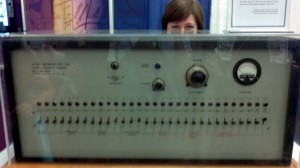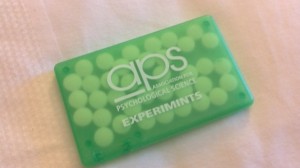Last week I attended the Association for Psychological Science Convention for the first time, including the Society for the Teaching of Psychology (STP) Teaching Preconference. I am grateful to STP for awarding me an Early Career Travel Grant to help me offset the cost of my flight all the way from Vancouver Canada to Washington DC.
One of my nerd-tastic highlights was seeing the actual apparatus Milgram used to examine obedience to authority back in the ’60s.

Beyond the obvious awesomeness depicted above, I can point to three key ways I benefited from attending this conference.
1. Networking
I have elaborated on how I went about networking in my previous post. Who I connected with was also critical. At the Teaching Preconference, I met two other research methods textbook authors, including the always-inspiring Beth Morling, and my US-Edition Cozby counterpart Scott Bates. Scott gave an insightful talk on how he is using the APA guidelines for psychology majors to steer his course (re)designs; it was fun to talk with him afterward about course design and how he came to work on the Cozby text too. Turns out both our stories share a similar right place/right time theme. Also, I was delighted to meet a fellow regional representative of the STP’s Early Career Psychologist Council, Ali O’Malley at Butler University.
For the rest of the conference, my networking opportunities were largely driven by Twitter conversations and chance encounters. For example, I happened to sit next to my UBC colleague Eric Eich during the good data practices symposium (see below). He’s the editor in chief of our field’s top journal, Psychological Science. Sitting next to him meant I met Bobbie Spellman, editor in chief of Perspectives On Psychological Science (PoPS). As speaker after speaker pointed to journal editors as the key to improving our field, it was interesting to consider their perspectives too. Tweeting regularly meant that people recognized me, I could learn what was happening in other symposia, and I had conversations in person and online that would not have been possible otherwise. Check out this Twitter feed for what was said by everyone using #aps2013dc.
2. Insight into Good Data Practices, Replicability, and Data Ethics
One of the major reasons I wanted to attend APS this year was the theme program on Building a Better Psychological Science. These speakers built on their contributions to a recent issue of PoPS focusing squarely on this topic. It was fascinating to hear Daniel Kahneman recall his early days as a psychologist, during which he gave up on a line of research that seemed profitable but he couldn’t replicate to his high standards. Apparently, his own introspection on how he could have been so convinced his small sample studies would replicate became the basis for his later revolutionary and Nobel Prize-winning work with Amos Tversky. Seems to have been a good choice.
Collectively, this lengthy line-up of speakers helped me reconsider the big-picture costs of the way our field has under-valued exact replications in favour of conceptual replications, and how we’ve been chasing p-values below .05. The arguments weren’t really new, but packaging them together in this symposium was impactful for me. Now that I’m a textbook author preparing for my 2nd edition, I found myself constantly considering how we can help our 2nd year psych majors learn best practices. For example, why not include an ethics unit in a statistics course? There’s usually one in research methods… but why not stats too, dealing with data management and reporting and fraud? Also, I’ll be changing the way I discuss the value of exact replications in my next edition. In courses, we could require our students to submit their data and analyses along with their final papers, to be able to reward data archiving and get our students into the habit of submitting raw data to back up claims. So much to (re)consider…
Talking to colleagues about the teaching-related implications of the Good Data Practices symposium was a fascinating exercise. It seems obvious to me that we should be “raising” our majors on best practices, yet there was more variability in reactions to this idea than I had expected. Many colleagues seemed to have simply not considered implications at an undergraduate level, but agreed with me that it’s a good place to start. In a couple of cases, I was challenged about whether such efforts would have any effect. These challenges have compelled me to consider writing a why bother/how-to piece to submit for publication. (Oh summer, could you give me an extra month?)
3. Ideas for my classes
Throughout the entire conference and preconference, I had tons of ideas for my courses! I mentioned a few above regarding methods and stats. In addition, Laura King helped me re-think how I approach Personality Psychology in intro: “you wouldn’t spend a full day discussing phrenology in the biological psychology unit, so why spend a full day on Freud in the personality unit?” Wow. That hit home. I do incorporate modern science of personality in intro, but I will be making major changes to that unit next year.
In her preconference keynote address, Beth Morling offered a ton of specific ideas for intro and methods, centred on her priority of creating effective consumers of psychological research. Specifically, she promotes teaching students to identify the type of claim being made (frequency, association, or causal), and asking four questions about the validity of the study (construct, internal, external, statistical). Which of the four validities is most important depends on the type of claim. See her blog for a bevy of excellent examples. This consumer-oriented approach will inform how I teach methods in intro in particular, where I’m not training psych majors.
Talks by Scott Bates and Keith Stanovich prompted me to strongly consider changing my supplemental readings for research methods. In addition to his course design process, Bates offered a great resource on the purpose of APA style as an indicator of values in the discipline. This article dovetails with conversations a colleague and I have had about this very topic (Jaclyn Rea of our Arts Studies in Research and Writing department). I am strongly considering incorporating this discussion into methods this fall. Usually, I assign parts of Stanovich’s text How to Think about Psychology. I’ve always known it’s unpopular with many students due to its long-windedness and general lack of pedagogical features to help students learn from it. I value his ideas, which was why I’ve been assigning it for years, but the packaging just doesn’t compel my students to read it. I must say that hearing him speak convinced me that although his ideas are insightful he seems to have little sense of audience–a feature reflected in his book, too. Although I’ll still draw from and cite his book, I may be replacing those readings with the APA style article and some other big-picture perspectives on replicability/methods.
Another idea came to me at a talk by Jason Priem, who is promoting his altmetrics approach to measuring scholarly impact. I’d like to create a shareable library for each course in Zotero including all the papers I cite during class. Students can follow up on any article they want, and I can always find what I’ve cited. It’ll be a lot of work to set up, but once it’s there, it’ll be a rich resource that’s easy to update and share.
****
What a fun exercise this was to reflect on my notes and memories from this conference! I highly recommend this process to anyone hoping to actually follow up on rich conference experiences. I am pleasantly surprised by how much I gained from going to APS. I had feared it would be just too big and overwhelming to extract anything meaningful, but that fear was wholly unfounded.
Thanks for reading. Have an experimint.


 Follow
Follow

